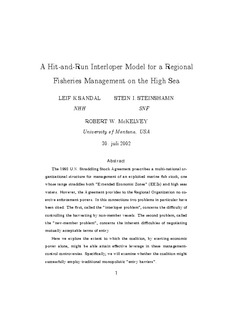A hit-and-run interloper model for a regional fisheries management on the high sea
Working paper
Permanent lenke
http://hdl.handle.net/11250/164061Utgivelsesdato
2002-07Metadata
Vis full innførselSamlinger
- Discussion papers (FOR) [566]
Sammendrag
The 1993 U.N. Straddling Stock Agreement prescribes a multi-national organizational structure for management of an exploited marine fish stock, one whose range straddles both .Extended Economic Zones. (EEZs) and high seas waters. However, the Agreement provides to the Regional Organization no coercive enforcement powers. In this connections two problems in particular have been cited: The first, called the "interloper problem", concerns the difficulty of controlling the harvesting by non-member vessels. The second problem, called the "new-member problem", concerns the inherent difficulties of negotiating mutually acceptable terms of entry.
Here we explore the extent to which the coalition, by exerting economic power alone, might be able attain effective leverage in these management- control controversies. Specifically, we will examine whether the coalition might successfully employ traditional monopolistic "entry barriers".
Game-theoretic economic analysis provides some helpful insights into this question, but the open-access character of resource exploitation on the high seas complicates its applicability here. On the other hand, the game is asymmetric, with the incumbent coalition enjoying certain advantages.
Our analysis lends support to the thesis that usually leverage to enforce regional management control must be sought elsewhere, other than through direct application of economic power within the harvesting sector.
Utgiver
Norwegian School of Economics and Business Administration. Department of Finance and Management ScienceSerie
Discussion paper2002:10
